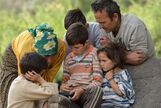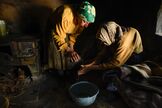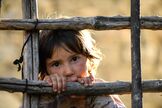Some time ago, when Japan donated materials to our country, it drove the "Renaissance" of ancient Chinese poetry on social networks. There was a sentence "Qi said no clothes, and the same robe with the son", which means that in this war, we are together. For it, my shirt is yours. The empathy and empathy of the Japanese people moved the people very much. It reminded me of an Oscar shortlisted film-"Honeyland" this year.
"Honeyland" won two Oscar nominations this year-Best Documentary and Best International Film. This 87-minute documentary was filmed for three years and accumulated more than 2,000. Hours of footage.
The heroine of the film, Hatiz, is the last female beekeeper in a village in the Republic of North Macedonia. After World War II, Yugoslavia and Turkey exchanged ethnic groups. Many villages in Macedonia were evacuated, while Khatiz was of Turkish origin who did not return to Turkey. In this deserted village, she lives with her mother who suffers from eye diseases, keeping bees and collecting nectar day after day. Every time she collects nectar, Khatiz insists on the principle of "take half and keep half". This is a gentleman agreement between her and nature and bees.
For decades, Khatiz has formed a stable triangular relationship with bees in this world.
In Khatiz, I feel the rare contract spirit . As a daughter, she adheres to the customs of the tribe, supports her mother and never abandons; as a beekeeper, she adheres to the principles of nature and does not take away all the honey, so that the bees have The way can go. Even if there is no paper contract, and only relying on spiritual beliefs, Khatiz still does not be lazy or tricky, and plainly abides by the agreement, which is enough to embarrass many speculators.
In real life, people like Hatez who uphold the spirit of contract 100% are so precious. For thousands of years, the earth’s endless growth and the development of human civilization are due to these strict observance of the principle of ecological balance and observing the relationship between life People of the boundaries.
However, a nomadic family broke into the village suddenly, destroying the balance between Khatiz and nature. This nomadic family has seven children and needs a lot of material to support it. In order to make money, they disregarded Khatiz's “take half and keep half” principle, and took all the honey from the bees. The bees killed each other in order to survive, and the bees raised by Khatiz disappeared.
The arrival of the nomadic family was completely unexpected by the main creative team. They injected drama conflict into the film, which is rare in documentaries, making the whole film suddenly have a plot line, tension, and become a complete one. The story is more emotionally rich and full.
Khatiz and nomadic families represent two completely different types of people in this world.
Khatiz respects nature and life; and nomadic families are self-interested, and the life and death of bees have nothing to do with them. So why not destroy a little ecology in order to acquire more resources as soon as possible?
The nomadic family showed greed because he couldn't empathize with Khatiz's ideas. This reminded me of the recent incident of Xiao Zhan fans that has made a lot of noise. One of the reasons why Xiao Zhan fans aroused controversy is the same as nomadic families—ignoring the rules of the game. In the eyes of many people, they abused their public power to infringe on the rights and interests of others, forcing the minority culture to have no retreat, destroying the cultural ecology, but still feel that they are just.
Yes, nomadic families feel that they are not wrong when they take the fruits of their bee labor. They think that they are the Lord of all things, believe in the weak and the strong, and stand at the top of the food chain and despise bees. Most humans have no empathy when facing animals inferior to them. Just like Xiao Zhan fans, when faced with the fan culture in their eyes, they cannot resonate. They cannot feel the pain of the fan audience losing their beloved things.
There is a layer of reproductive isolation between the joys and sorrows of different species; and the joys and sorrows between human beings are not connected. Therefore, in the predicament of the epidemic, when the Japanese people express their empathy in poetry, we are deeply touched, and they understand our pain.
On the other side of the earth, nomadic families have come and gone, leaving only Khatiz who lived here in devastation.
Someone might argue that since Khatiz lived in such an embarrassment and precarious life in this village, why didn't she move to another place? This question can be answered with a humanistic program "The Poor and Rich Man" produced by Radio Hong Kong.
The program format of "Battle of the Poor and Rich" is similar to that of "Metamorphosis" in the mainland, inviting rich guests to experience the life of the poor for a few days. During this period of time, they must completely give up living in a western-style building, raising a dog, getting in and out of luxury cars, drinking the upper-class life of Lafite for 82 years, and going to the bottom, whether it is working as a cleaner, delivering food, Still sleeping on the streets, they are not allowed to borrow the resources they had when they were rich.
One of the guests was Tian Beichen, President of Hong Kong Garment Group. Before the experience, he said in an interview (to generalize), "I believe that a free market will eliminate the weak. But if there is fighting spirit, the weak can also become the strong. "
So, is the free market really as fair as he said?
In the program, Tian Beichen lived in a cage house of a few square meters. He woke up at 5 o'clock in the morning and squeezed the subway to catch the morning shift. He worked hard to sweep the streets and clean up the garbage. He only earned a few dozen yuan a day, and he even had to eat a tea restaurant. Calculating the income and expenditure painfully with his fingers...The plight of these poor people is far beyond Tian Beichen's previous cognition. He never dared to imagine that one day he would be melancholy for a meal of 25 yuan.
Tian Beichen overturned his previous remarks. The free market is not so fair. This society is severely punishing people who have no chance to study. Seriously feel the "no chance to read" in the second half of this sentence. It points out the essence of the problem, the uneven distribution of social resources, and the competition between people is of different dimensions.
Looking back at Khatiz in "Honeyland", she was born in a remote village, and she was tens of positions behind the people who grew up in the fertile area on the starting line. On the one hand, she has to follow the customs to take care of her parents; on the other hand, the poor family conditions make her unable to afford the costs and risks of leaving the village at all. To run away means that she needs to prepare for a travel expense, a cost to buy/rent a house elsewhere, and the courage to give up decades of habits and start again.
Many people are aware of this inequality between the poor and the rich, but they may not be able to truly understand this inequality. Therefore, on the 996 issue that once caused controversy, before the news that so many salaried workers suddenly died at their desks in the early morning, some people still said, "You are not rich enough and good enough because you are not working hard enough."
If a class leap can be achieved by effort alone, isn't Khatiz not positive enough? Years and months, climbing on the cliffs to collect honey, shouldn't she have become a dominant player in the honey industry long ago? Why are you stuck in a stone house in a small village for decades?
Yes, different life experiences make people unable to empathize when they see the suffering of others. As a netizen said: "We can imagine the sweetness of honey, but there is no way to appreciate the loneliness of a beekeeper."
Only after encountering a common disaster and facing a common predicament, human sorrows and joys will be connected.
For example, when masks have become a scarce resource, we can feel the pain of seeing the elderly in China using orange peels as masks, and seeing the Iranian elderly using sack skins as masks, because everyone is living with the same virus and the same Under the anguish shrouded in the pain, at this moment, people understand the meaning of "the mountains and rivers are different, the wind and the moon are in the same sky".
Whether it's "Honeyland", "Poor and Rich Man's Battle", or the new crown epidemic, they all teach us that next time when facing other people's things, even if we can't achieve the same sorrows and joys, we should not arbitrarily fall into the trap.
In the film, one of the segments that made me sigh the most was that towards the end, Hatiz said to her mother: "Can you imagine the coming of spring?" The mother replied, "Will there be spring? Too many winters have passed. ."
This article was first published on the public account: Nandu Weekly (nbweekly)
View more about Honeyland reviews






